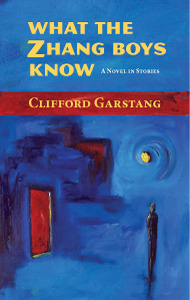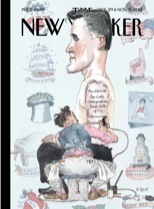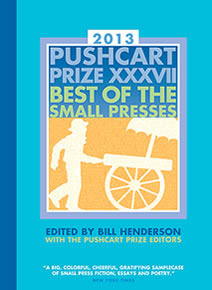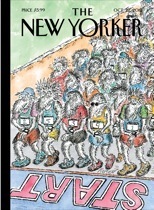Clifford Garstang's Blog, page 92
October 25, 2012
2013 Pushcart Prize Ranking — Fiction
It is time once again to present the annual Perpetual Folly Pushcart Prize Rankings for Literary Magazines. I’ll be rolling these out over the next three days, beginning with the Fiction ranking, which is below. (Nonfiction Rankings will appear on 10/26/12 and Poetry on 10/27/12).
For comparison purposes, see the 2012 Fiction ranking here.
I feel compelled every year to offer a disclaimer for the list. I originally created it in order to aid my own efforts at targeting my submissions of short stories to literary magazines. I used the Pushcart Prize because I felt that it represented the broadest range of magazines among the annual prizes (including Best American Short Stories and the O. Henry Awards).
My method is straightforward. I use a ten-year rolling database and award points to magazines for the prizes awarded and fewer points for each special mention. I don’t go further back than ten years because it seems to me that what is relevant is the current success of the magazines, not their storied past. Also, the further back we go, the more defunct magazines we find, and that’s not terribly helpful. Some have argued that a five-year period should be chosen instead. That seems too small a sample. When only 19 or 20 prizes are awarded in fiction each year, I think ten years provides a clearer picture of a magazine’s success.
Some people don’t like rankings at all, and I understand that. This ranking, however, is as objective as I can make it. The Pushcart Prize itself is subjective, of course, but that’s an entirely different question.
A note on symbols. I have marked magazines that I believe to have ceased publication with ©. Several magazines have a (?) by their name which means I can’t find a website for them. Please leave any corrections or updates in the comments.
What is notable about this year’s list? Here are some observations:
The gap between Ploughshares and the rest of the pack has closed a bit, with Conjunctions and Tin House tied for second, just 20 points back.
One Story continues to climb the charts. It’s up to #6 this year.
Triquarterly and Shenandoah both were shut out of Prizes and Special Mentions this year and drop down a few spots on the list. Is this punishment for their move online?
Wigleaf, a wonderful online journal of flash fictions, debuts on the list at #68, winning its first-ever Pushcart Prize.
Fiction Rankings for 2013:
2013
Magazine
2013 Score
1
Ploughshares
93
2
Conjunctions
73
2
Tin House
73
4
Zoetrope: All Story
71
5
Southern Review
66
6
One Story
56
7
Georgia Review
54
8
Threepenny Review
53
9
Kenyon Review
50
10
Paris Review
48
11
A Public Space
44
12
McSweeney’s
42
13
Missouri Review
40
14
Epoch
39
15
New England Review
36
16
Ontario Review ©
35
17
Boulevard
33
18
New Letters
31
18
Noon
31
18
Virginia Quarterly Review
31
21
Gettysburg Review
30
21
Shenandoah
30
23
TriQuarterly
27
23
Witness
27
25
Antioch Review
24
25
Five Points
24
27
Agni
23
27
Mississippi Review
23
27
StoryQuarterly
23
30
Sun
22
31
Ecotone
21
31
Iowa Review
21
33
Bellevue Literary Review
19
33
Glimmer Train
19
33
Prairie Schooner
19
36
Colorado Review
18
37
American Short Fiction
16
37
Michigan Quarterly Review
16
39
Hudson Review
15
40
Crazyhorse
14
40
ZYZZYVA
14
42
Willow Springs
13
42
Yale Review
13
44
Alaska Quarterly Review
12
44
Idaho Review
12
46
American Scholar
11
46
Harvard Review
11
46
Narrative
11
49
Image
10
50
Cincinnati Review
9
50
Oxford American
9
52
Chelsea ©
8
52
Post Road
8
52
Third Coast
8
55
J Journal
7
55
Little Star
7
55
Manoa
7
55
Massachusetts Review
7
55
Pen America
7
55
Speakeasy ©
7
61
Caribbean Writer
6
61
Florida Review
6
61
Indiana Review
6
61
New Orleans Review
6
61
News from the Republic of Letters
6
61
Sonora Review
6
61
Water-Stone Review
6
68
Black Renaissance Noire
5
68
Fiction International
5
68
Grand Street ©
5
68
Mid American Review
5
68
North American Review
5
68
Pleiades
5
68
Raritan
5
68
Salmagundi
5
68
Univ. of Georgia Press
5
68
Wigleaf
5
78
Beloit Fiction
4
78
Black Warrior Review
4
78
Daedalus
4
78
Hopkins Review
4
78
New York Tyrant
4
78
Ninth Letter
4
78
Northwest Review
4
78
Other Voices ©
4
78
Pinch
4
78
Sewanee Review
4
78
Southwest Review
4
89
Another Chicago Magazine
3
89
Appalachian Heritage
3
89
Event
3
89
Fiction
3
89
Gulf Coast
3
89
Notre Dame Review
3
89
River Styx
3
89
West Branch
3
89
Western Humanities Review
3
98
[sic]
2
98
Akashic Books
2
98
American Letters & Commentary
2
98
At Length
2
98
BkMk Press
2
98
Blackbird
2
98
Boston Review
2
98
Briar Cliff Review
2
98
Brooklyn Rail
2
98
Brooklyn Review
2
98
Calyx
2
98
Carve
2
98
Chautauqua
2
98
Cimarron Review
2
98
Columbia Review
2
98
Confrontation
2
98
Crab Orchard Review
2
98
Doubletake ©
2
98
Electric Literature
2
98
failbetter.com
2
98
Faultline
2
98
Fifth Wednesday
2
98
Fourteen Hills
2
98
Graywolf Press
2
98
Hotel Amerika
2
98
Inkwell
2
98
Paper Street © (?)
2
98
Passages North
2
98
Redivider
2
98
Sarabande Books
2
98
Southampton Review
2
98
Sou’wester
2
98
The Journal
2
98
Timber Creek Review (?)
2
98
Turnrow
2
133
Amazon Shorts ©
1
133
American Literary Review
1
133
Antietam Review ©
1
133
Artful Dodge
1
133
Arts & Letters
1
133
Ballyhoo Stories
1
133
Baltimore Review
1
133
Bamboo Ridge
1
133
Bellingham Review
1
133
Blue Earth Review
1
133
Blue Mesa Review
1
133
Bomb
1
133
Brain, Child
1
133
Callaloo
1
133
Canio’s Editions (?)
1
133
Carpe Articulum
1
133
Chariton Review
1
133
Chattahoochee Review
1
133
Contemporary West
1
133
Copper Nickel
1
133
Cutbank
1
133
Denver Quarterly
1
133
Descant
1
133
Dogwood
1
133
Dos Passos Review
1
133
Dossier Journal
1
133
Eggemoggin Reach Review (?)
1
133
Epiphany
1
133
EWU Press ©
1
133
Exile
1
133
Five Chapters
1
133
Folio
1
133
Freight Stories
1
133
Fugue
1
133
Gray’s Sporting Journal
1
133
Green Mountains Review
1
133
Grist
1
133
Hampton Shorts (?)
1
133
Healing Muse
1
133
Hunger Mountain
1
133
Isotope ©
1
133
Jabberwock Review
1
133
Kelsey Review
1
133
King’s English ©
1
133
Kyoto Journal
1
133
Lake Effect
1
133
Laughing Fire Press
1
133
Laurel Review
1
133
Lit
1
133
Literal Latte
1
133
Lynx Eye ©
1
133
Maggid
1
133
Margin (?)
1
133
McSweeney’s Books
1
133
Mid-List Press
1
133
Momotombo Press
1
133
Mythium
1
133
Nebraska Review ©
1
133
Nerve.com
1
133
New Ohio Review
1
133
New Renaissance
1
133
Night Train
1
133
Nimrod
1
133
Northern Lights (?)
1
133
Open City
1
133
Orion
1
133
Partisan Review ©
1
133
Pearl
1
133
Pegasus Books
1
133
Per Contra
1
133
Phoebe
1
133
Pindeldyboz ©
1
133
Press 53
1
133
Prism
1
133
Puckerbush Press
1
133
Puerto del Sol
1
133
Quarter After Eight
1
133
Quarterly West
1
133
Quick Fiction
1
133
RBS Gazette (?)
1
133
Relief
1
133
Rivendell ©
1
133
Rosebud
1
133
Salamander
1
133
Seems
1
133
Slice
1
133
Small Town (?)
1
133
Smoke Long Quarterly
1
133
Soft Skull Press
1
133
South Carolina Review
1
133
Southern California Review
1
133
Spork
1
133
Stolen Time Press (?)
1
133
Stone Canoe
1
133
Subtropics
1
133
Sycamore Review
1
133
Tampa Review
1
133
Tiferet
1
133
Transformation (?)
1
133
Underground Voices
1
133
Upstreet
1
133
War, Literature and The Arts
1
133
Words of Wisdom (?)
1
133
World Literature Today
1
133
Xconnect (?)
1
133
Texas Review
1
133
Common, The
1
133
Anomalous
1
Peeking Between the Pages Reviews What the Zhang Boys Know
 Another blogger is heard from on the Virtual Book Tour for What the Zhang Boys Know. This time, it’s Peeking Between the Pages who has nice things to say about the book.
Another blogger is heard from on the Virtual Book Tour for What the Zhang Boys Know. This time, it’s Peeking Between the Pages who has nice things to say about the book.
All of the characters in this novel are flawed, just as all human beings are. They aren’t perfect; they are just trying to get through their lives the best they can. I love how all the stories weaved together in some way as for me that is the one thing that really does make a book of short stories work. I also liked how the Zhang boys, although young and not always understanding the real issues, could still give you a pretty good update on what was going on with everyone in the building. It just goes to show how much the young ones really do absorb. This was a good read for me. I enjoyed the book and the author’s writing style and I look forward to reading more from him.
Read the rest of the review and enter the contest to win a copy of the book here.
October 23, 2012
Reading on a Rainy Day Reviews What the Zhang Boys Know
 The Virtual Book Tour continues. Today we hear from Reading on a Rainy Day, which had some very nice things to say about What the Zhang Boys Know.
The Virtual Book Tour continues. Today we hear from Reading on a Rainy Day, which had some very nice things to say about What the Zhang Boys Know.
What the Zhang Boys Know is a wonderful short story collection, although it’s more than just a short story collection. The characters are connected enough for one to feel a sense of continuity and familiarity. The prose is very quick-paced and highly readable and I could probably have finished the book in a day, but there was a sense of comfort in reading just a story or two a day and then subconsciously pondering about them. The writing was also very beautiful, and the different voices across the stories didn’t jar my concentration but instead felt sufficiently seamless and distinct. This one is definitely one of my favorite short story collections.
Read the whole review here.
October 22, 2012
The New Yorker: “Ox Mountain Death Song” by Kevin Barry
 October 29, 2012: “Ox Mountain Death Song” by Kevin Barry
October 29, 2012: “Ox Mountain Death Song” by Kevin Barry
Although the opening of this story confused me—I guess I was supposed to know that Barry is Irish or that the Ox Mountains are in Ireland—I was immediately attracted to the language. (I’ll come back to that in a minute.) There were fresh combinations of words and some expressions I didn’t understand (and, at the time, didn’t guess that this was because they were Irish) but that still appealed to me. The first line is “He had been planting babies all over the Ox Mountains since he was seventeen years old.” Baby what, I wanted to know. Oh. I get it. Babies. “Well he had the hair for it, and the ferret grin, and there was hardly a female specimen along that part of the Sligo-Mayo border that hadn’t taken the scan of his hazel glance, or hadn’t had the hard word laid on, in the dark corners of bars, or in the hormone maelstrom of the country discos, or in untaxed cars, down back roads, under the silly, silly moonlight.” And so on.
The language is often lyrical, and Barry alludes to this in the Q&A with Kevin Barry: “The rhythm of the prose works off refrain and reprise. At the level of the sentence, what interests me above all is its sound. I will happily subvert a sentence’s meaning for the sake of how it sounds, and then just go with whatever change results; I’ll let the sound dictate the story.”
I believe that. While the language is sometimes a little difficult to follow, it’s always beautiful. In the Q&A Barry also tells us that he is fond of introducing both genre elements—he sees this story as something of a Western—and non-realistic elements. Here, one of the two main characters does seem somewhat supernatural, and the other is sure he can sense what is going to happen.
The story is almost beside the point, but there’s this: Sergeant Tom Brown is pursuing “a Canavan”—part of a notorious family because he has the sense that there’s going to be a killing. He tracks Canavan down to the home of a woman who has been beaten and she reluctantly tells Brown where Canavan might be found. Importantly, Canavan has cancer and is going to die, which makes him even more dangerous. (Although he’s only 29, he’s been told that treatment would make his hair fall out—his beautiful hair!—and render him impotent. So he’s opted to forego the treatment.)
Barry tells us that both characters are something of a “type.” But what do you suppose is the significance of Canavan’s cancer, or that Brown, at 67, is also nearing the end of his life. Are the types disappearing? Is this aspect of Western Ireland disappearing? And is that what it means at the end when Brown finally confronts Canavan?
New Pushcart Prize Rankings Coming Soon!
 The new edition of the Pushcart Prize–Best of the Small Presses just arrived, so in the course of the next few days I will be updating my Pushcart Prize Rankings for Fiction, Nonfiction, and Poetry.
The new edition of the Pushcart Prize–Best of the Small Presses just arrived, so in the course of the next few days I will be updating my Pushcart Prize Rankings for Fiction, Nonfiction, and Poetry.
Stay tuned!
October 19, 2012
New Issue of Prime Number Magazine
 I am very pleased to announce that Issue 29 of Prime Number Magazine is now LIVE! With lots of good stuff:
I am very pleased to announce that Issue 29 of Prime Number Magazine is now LIVE! With lots of good stuff:
Fiction from Frank Scozzari, Mary Akers, Ron Capps, and Justin Van Kleeck;
Craft essays by Wendi Berry and Jody Forrester;
Nonfiction by Lorrie Lykins, Gabriella Burman, and Terry Barr;
Poetry by Aviva Englander Cristy, Regina Coll, Austin Kodra, and Shelby Stephenson;
a Press 53 53-word Story;
a review of Rebecca Dunham’s book;
and an interview with Andrew Scott.
October 16, 2012
BookNAround Reviews What the Zhang Boys Know
 The Virtual Book Tour continues.
The Virtual Book Tour continues.
Recently, the blog BookNAround posted a review of What the Zhang Boys Know that does a good job of exploring the link that ties the stories in the book together–those nosy little Zhang Boys who get into the lives of all the residents of their condo building:
They are all, in their own way, like Zhang Feng-qi, searching for love and learning to overcome the disappointments, tragedies, and unhappiness in their pasts. Every one of them, whether they know it or not, is looking for connection in this fragmented, lonely world. The small Zhang brothers dart in and out of each of the narratives, taking in the truth of the other inhabitants of their building, quietly noticing the tenuous, fragile bonds of the others, silent figures on the fringes of everyone’s stories.
October 15, 2012
The New Yorker: “The Breatharians” by Callan Wink
 October 22, 2012: “The Breatharians” by Callan Wink
October 22, 2012: “The Breatharians” by Callan Wink
If you love cats, you might not like this story much. In fact, if you love animals you might have a problem with it. But if you can get past that, I think you’ll find a pretty darn good story.
Here are the basics: A boy, Augie, lives on a farm with his parents. Except his mother lives in the old house—the one she was raised in on the farm—and the father lives in the new house with Augie and, sometimes, Lisa, the young woman who works on the farm and is, apparently, sleeping with Augie’s father. Also living on this farm are a gazillion cats, and Augie’s father assigns him the job of killing all the cats, with a $1 bounty per tail. The boy doesn’t have anything against cats, but he has fond memories of his dog—a recently deceased mutt who was exactly his age, having been given as a puppy to Augie when he was born.
The mother, apart from her estrangement from the father, is a bit strange. She chain smokes Tiparillos and she has decided that she no longer needs to eat. She’s become a inedite, or a breatharian, someone who consumes only air. She’s also not much troubled by Augie’s cat-killing chore.
If the story were only about killing the cats, the cruelty would be a problem, but of course it’s about much more than that. As Wink himself says in the Q&A with Callan Wink, the story is really about the boy being pulled in different directions by his parents, and also the other characters being pulled in different directions, too.
Wink had a previous story in The New Yorker, “Dog Run Moon,” that is pretty memorable. I discussed it here.
It’s hard to get past the animal cruelty in this story, but I really enjoyed it.
What the Zhang Boys . . . Eat
 The friendly folks at the Book Club Cook Book invited me to share with them a recipe that is somehow tied to my new book, What the Zhang Boys Know. So now you can read all about Stir-fried Beef and Broccoli Shanghai Style and why I chose it. (Hint: the Zhang Boys’ grandfather is from Shanghai and he’s not a bad cook.)
The friendly folks at the Book Club Cook Book invited me to share with them a recipe that is somehow tied to my new book, What the Zhang Boys Know. So now you can read all about Stir-fried Beef and Broccoli Shanghai Style and why I chose it. (Hint: the Zhang Boys’ grandfather is from Shanghai and he’s not a bad cook.)
While you’re there, explore the site, find other recipes from other authors, sign up for various book giveaways, etc. But it might make you hungry!
Essay: Doorways on the Creative Process
 Here’s a short essay that I wrote for the The Story Prize Blog, all about my creative process while working on the first draft of my new book, What the Zhang Boys Know.
Here’s a short essay that I wrote for the The Story Prize Blog, all about my creative process while working on the first draft of my new book, What the Zhang Boys Know.
It happens rarely, but sometimes the words come quickly, flowing rather than dripping onto the page. It’s not a trance, exactly, but it comes close. [read more]



